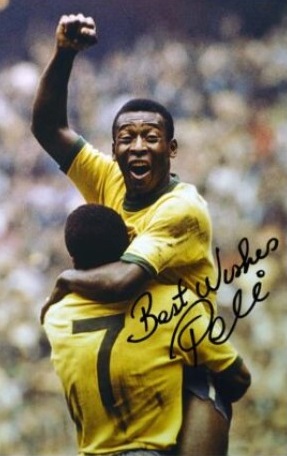The news is that Pele, the legendary Brazilian football star, has died. He was 82 and suffering from colon cancer, so you could say that this was to be expected. However, there is a sense that the world has lost something valuable, and for the second time this year, I find myself feeling emotional over the loss of someone I never knew at all (the first time being the Queen).
Why does the loss of a man I never met feel so sad? I guess you could say that although I am far away from Pele, it feels like he was part of my life for so long. The funny thing is when I started watching international soccer, Pele had long since retired, and the star of international soccer in the 1980s was Diego Maradona. I grew up seeing the magic of Maradona, yet, Pele, whom I never saw, seemed so much “greater.”
So, the question of what defines “greatness” needs to be asked. In answering that question, I would probably say that the answer lies in “artistry” and “humanity,” which are inevitably hard concepts to understand in a world driven by data and statistics. Pele has statistically done many things which today’s modern superstars are still struggling to overcome. However, the old saying is that “records are made to be broken.”
The recently retired Roger Federer, for example, won 20 grand slams and has seen his two rivals overtake his record. Yet, he’s still a leading contender for the “greatest-ever” title. So, nobody doubts that Pele’s records will eventually be surpassed, yet like Mr Federer in tennis, nobody doubts that Pele will remain the “greatest” in the minds of generations to come.
So, greatness has to be more than something about recordable statistics. I’d argue that a great figure is someone who transcends their profession and all sorts of boundaries like race, class, nationality and so on. They are figures that belong to humanity rather than to a particular group. Let’s take Nelson Mandela as an example. He was the first black president of South Africa. However, as far as humanity is concerned, he’s more than a black politician in South Africa. He’s an example of what the rest of us try to emulate.
In the case of Mandela, it’s easy to see the greatness – he was a national leader of high moral standing and inspired hope on a continent where national leaders are better known for inspiring despair. Can the same be said of sports heroes? Unlike, say, artists or musicians, they don’t leave behind something tangible. You can see a Van Gough, and you can listen to Mozart, but do you know who the best boxer was two hundred years ago?
Well, there are two sporting icons that come to mind when you talk about greatness. They are Mohammad Ali and Pele. Both became greater than their respective professions. You don’t have to watch boxing to know Muhammad Ali, and you don’t have to watch soccer to know Pele. Both men were artists. Watching Ali fight was like watching an artist in action. Watching Pele in action was watching a virtuoso:
As current Brazilian superstar Neymar points out – “Pele turned football into an art.” How do you define art? Well, I guess you could say that art is something so beautiful that it makes people stop and look and feel something. Paintings of great masters, for example, are so powerful that people stop what they’re doing to admire them.


For a sports star, you become an artist when even those on the opposite end of the field find the privilege of playing against you greater than the sting of defeat. Former England player described his experiences with Pele as “I was proud to be on the pitch with him.” The tributes from today’s stars also make the point that greatness is also about inspiring others to be great.
Like Mohamad Ali, Pele also worked beyond his sport. After retirement, the man worked tirelessly to give the poor hope and fought against the corruption in Brazilian soccer, earning him the enmity of fellow Brazilian João Havelange, who ran FIFA at the time. Pele was also accused of having “leftist” sympathies by Brazil’s military dictatorship.
Whilst Pele was a little fond of the ladies (he was married three times), he avoided the hard-partying lifestyle of many of his contemporaries, including Diego Maradona (Pele died at 82 – Maradona died at 60). He argued that it was important to set an example.
I never watched Pele play except for the clips of him on YouTube. Yet, he was a presence in my life, and I look at soccer matches through the images he created. This greatness lives beyond your prime and even your own life. If anyone deserves to rest in peace, it is Pele.
A version of this article first appeared at beautifullyincoherent.blogspot.com

